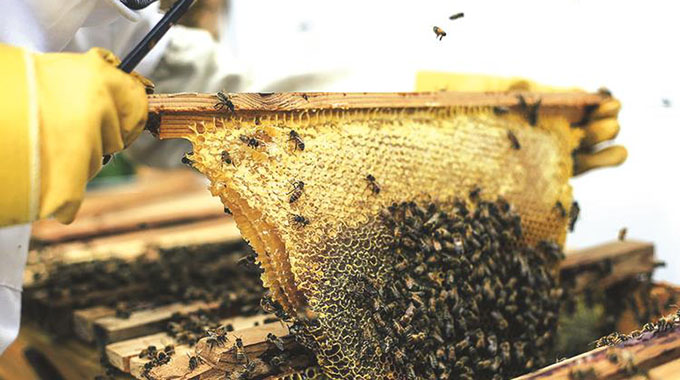Bee-keeping project to help rural development

Nesia Mhaka
Herald Correspondent
Government, in collaboration with the United Nations Development Programme (UNDP), has implemented a bee-keeping project in Matabeleland South to mitigate the effects of climate change and to improve people’s livelihoods.
The programme, which is being supported by the Russian Government, is aimed at contributing towards the implementation of Zimbabwe’s Nationally Determined Contributions (NDC) under the Paris Agreement on Climate Change (STIZ- NDC). The bee-keeping project, which is being facilitated by the Ministry of Environment, Climate, Tourism and Hospitality Industry was introduced in Khame and Huwana villages under Bulilima district. The main objective of the project is to reduce the country’s carbon footprint and promote environmental stewardship in rural communities through provision of sustainable livelihoods options that enhance forest management and conservation.
Ministry of Environment, Climate, Tourism and Hospitality Industry project manager Mr Lawrence Mashungu said the STIZ-NDC project intended to facilitate a training exercise on forest management through bee-keeping. He said forest management initiatives such as bee-keeping will conserve the country’s forests, which were acting as the principle mitigation vehicle against climate change.
“It is anticipated that engagement of local communities in the bee-keeping project will result in sustainable forest management as the community starts benefiting from the proceeds of the honey and honey itself, which will provide much needed nutritional content for the community,” said Mr Mashungu.
“This should result in reduced over-dependence on activities that degrade forests such as selling firewood as a livelihood option. Engaging communities in such nature based entrepreneurial activities will also enable the country to fulfil its NDC commitment to the United Nations Framework Convention on Climate Change (UNFCC) of reducing its emissions by 33 percent per capita below the business as usual scenario.”
Mr Mashungu said investing in bee-keeping will go a long way in creating vast potential to spur rural development.
“Under the project, Ward 8 and 22 residents received theoretical training for hive making, protective clothing smokers and hive accessory tools through-project-partner,” he said.
“The communities were trained on ways to increase honey yields, controlling diseases and pests that attack bees, controlling effects of pesticides on various species of bees, understanding behavioural characteristics of bees, marketing strategies, maintaining financial records and savings, community mobilisation and engagement for sustainable livelihoods.” Forestry Commission director Mr Obedinego Marufu said bee-keeping projects had become a practical tool for the commission to raise awareness on the importance of forests in communities.








Comments